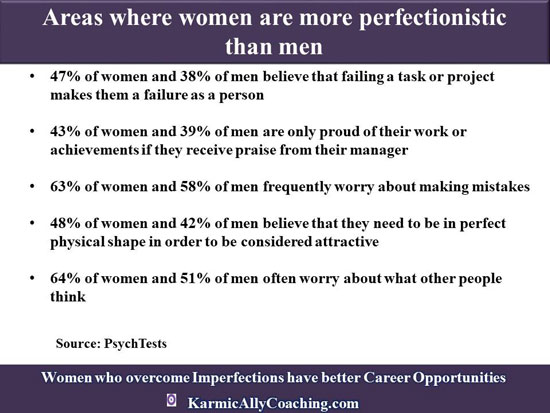This post has already been read 186 times!

I see a lot of this come up with women professionals. It is time to address the elephant in the room – perfectionism which leads to procrastination and even imposter syndrome. Imagine how much better your career and life would be if you only embraced your imperfections?
This came up as a topic with a client who wanted to know how to overcome her urge for perfectionism. A wise high achieving woman professional, she knew this habit was holding her back. She was ready to work on overcoming it.
She isn’t alone in experiencing perfectionism and the impact it can have on her life and career.
Many of us are taught from a young age to aspire to excellence in all areas of our lives. The pursuit of this excellence leads to being branded as super women and it looks good from the outside but what about what’s happening under the surface?
Our subconscious mind tells us we need to be perfect in everything we do and there can be no margin for error or imperfection.
As my boss and mentor advised me, one needs to step up to the plate and not wait to get what we desire. We have to ask for what we want and be proactive in expressing our needs, whether it is more responsibilities, support or resources.
Compared to our male counterparts, we might not take the right steps at the right time to further our careers because of our perceived imperfections.
The end result is it can lead to limiting beliefs and risk avoidance. It’s also tiring and constrains our professional progress, work-life balance and well-being.
Perfectionism doesn’t operate in silos. It impacts your entire life.
For example, if you’re active on social media, you’ll notice how everyone is striving to be perfect.
If you join the bandwagon, you’ll find you can’t post a selfie without at least one filter or go out for dinner without showing your curated plate of food. Even your dog has to look perfect.
Wouldn’t it be simpler to embrace our imperfections?
The numbers tell an important story about perfectionism
The roots or origins of perfectionism can often be found in our childhood experiences or early in our career when we are seeking a role model.
Studies suggest girls are more likely to internalize perfectionism, particularly because societal norms often encourage them to value appearance and social acceptance.
Research conducted by Girlguiding UK revealed that 36% of girls aged 7-10 believe their perfect looks are paramount. This internalization can relate to how we socialize girls to be more conscious of others’ perceptions and to conform to social standards.
Boys, on the other hand, often experience external pressures to demonstrate competence and control, shaping a different facet of perfectionism.
Childhood experiences impact us in our adult years because the habit is deeply ingrained in our subconscious mind.
Being exposed to higher expectations or competitive environments at a young age like excelling in academics or being the best in class becomes normal for us.
We find it difficult to embrace our imperfections and ignore the areas where we are competent and excel in.
Women are generally socialized to be more compliant and detail oriented. This can translate into higher levels of perfectionistic self-expectations.
While men often face intense pressure to succeed in competitive environments, shaping their form of perfectionism more around the societal benchmarks of success and failure.
Studies suggest that women do tend to experience higher levels of socially prescribed perfectionism than men. Especially in the areas of appearance, relationships, performance, and academic achievement.
Quantifying perfectionism is challenging, as it exists on a spectrum.
However, estimates suggest that about 30% of the general population exhibits traits of perfectionism to a degree that significantly impacts their quality of life.
Consider these findings from a 2022 study with data collected from 1,410 people who took the Perfectionism Test and you’ll get a feel for the issue.
PsychTests’ researchers looked at the degree to which men and women demand too much of themselves, set the bar too high, or create unrealistic expectations.

There are however, 2 areas where women and men are equally perfectionistic:
- 57% of women and men said that they hate the idea of being considered “average” in anything
- 66% of women and men believe that they must excel at anything they take on.
There is a fine line between wanting to achieve excellence and pushing yourself to be perfect.
The former requires a person to put in 100% effort; the latter requires the person to be flawless and leaves absolutely no room for error.
You can do something very well, but you can never achieve absolute perfection.
As Dr. Ilona Jerabek, president of PsychTests points out, “Perfectionists want to excel at everything they do, and when they don’t, they end up chastising and even hating themselves. It’s the Sisyphus effect: no matter how hard they try to attain their lofty objectives, they rarely, if ever, succeed 100%. Perfection just doesn’t exist. Yet, many people, especially women, will still push themselves to try to achieve it.”
How do we embrace our imperfections?
While perfectionism is required for high-risk tasks, it can become a detriment at a later point. Especially if it leads to fear of failure or procrastination.
It’s important to be aware of what can trigger our impulse to resort to perfectionism and if it has a secondary benefit to avoid bigger issues.
Different things can trigger this behavior. Being aware of the triggers will enable us to see it as a habit and then create a new and more empowering habit.
Knowing what is more important to us helps in focusing our energy on the right tasks.
It’s important to focus on the whole picture instead of using a tunnel vision and focusing on only one aspect.
When our Inner Voice or Critic tells us that we must or ought to do something, acknowledge the inner voice but then question why.
Sometimes it is the subconscious mind that is bringing up something from the past that is still able to control our current response.
Consider using a Perfectionism Diary to record triggers and analyze the source of perfectionism.
Questions to help rationalize the tendency to resort to perfectionism are
When you are doing something which is taking a lot of time or energy or is particularly stressful, ask yourself:
- What are the benefits that I am trying to achieve from this activity? What will the consequences be if I do achieve it and what if I don’t achieve it, or if I only partially achieve it?
Tailor the amount of time and energy you are putting into the activity according to how significant the consequences are one way or another. Remember this is your estimate of significance not someone else’s. You can of course take into account the views of others.
- How likely am I to achieve the outcome I want or at least to prevent an outcome I don’t want?
Take this into account in estimating how much time to expend on an activity. You only have a limited amount of time available to you. Try not to use up too much time on efforts which seem likely to be fruitless.
- How productive is the activity? – If you are spending a lot of time and energy but not achieving much and this seems likely to continue, then consider any different way that you could do the activity to produce a more productive result.
For example, you may decide to limit the time you spend on the activity but to make sure that the time you do spend is more focused.
If you can’t think of any options yourself then try seeking advice or suggestions from someone you can trust to give you reliable advice in the situation.
Reframe your thoughts to stay realistic
- If you have a tendency to see the negative in what you do and discount the positive, then try to do the opposite and notice the positive.
If you are inclined to say things like: “I did 90% of what I wanted but I didn’t manage to finish everything because I failed to start on it until the afternoon”.
You might rephrase this as: “Although I didn’t start until the afternoon, I am pleased that I still managed to get 90% of what I wanted done.”
2. Make a list of positive things you have achieved in the week. This includes things however small they may be – and note positive feedback from others that you have received.
3. If you don’t achieve something you set out to achieve, remind yourself of the following:
- A person’s worth is not determined by their achievements. Older people when they look back on their lives attach more importance to relationships than to achievements.
- You do not need to be perfect to be happy. Indeed many ‘high achievers’ are not happy. Conversely, many people of average ability and talents are content and fulfilled. Which would you prefer to be?
- Sometimes, focusing on doing something you enjoy rather than worrying forever about the end result can actually help you to achieve more. Give yourself permission to do some things you enjoy (so long as they don’t harm others). See if there are ways that you can make the things that you don’t enjoy a bit more enjoyable or less daunting.

Final words of advice on embracing imperfections
Whether it’s your career or life, remember that you are always in control of how you wish to respond to any situation.
What if you just decided to take a step away from all the competition, all that clamoring for likes and hearts? What if you chose merely to enjoy your life without sharing it with the world?
Here’s how you can reclaim your life and be happier.
-
Stop judging
Decide right now to stop analyzing other people, looking for what’s wrong with their face or their body or their life choices. Refocus your attitude, so you stop seeing a difference as a flaw but as merely something that makes that person unique.
Just let go of the urge to criticize others, and you’ll notice a flow-on effect on how you see yourself.
-
Accept your imperfection
Wanting to be the best version of you isn’t the same as being a perfectionist. A perfectionist is never happy with who they are, how they look, or how they’re doing. Being your best means you work hard, you try, and you don’t give up. But it doesn’t mean you blame yourself when things aren’t perfect, and you don’t take failure personally.
-
Relax and enjoy the process
Perfectionists tend to trip over every little detail and allow imperfections to spoil their lives. When you embrace imperfection as a natural part of life, it frees you up to enjoy the ride.
Obstacles become challenges that make life more enjoyable. You can slow down and notice all the good things there are in your life.
-
Adopt imperfection as a way of life
Once you make peace with imperfection, you can be a lot more objective about life. Your perspectives changes, and what once seemed overwhelmingly important suddenly doesn’t matter so much. All experiences become just another aspect of a life lived richly, that build the person you are continually becoming.
Imperfection stops being something to avoid at all costs. Think about it like this: perfection implies stasis, something you achieve and have to tend. It’s fragile and vulnerable. It puts an end to growth.
And then what? You don’t want to stop learning and growing and developing, do you?
Embracing imperfection means there’s always an opportunity to learn and grow and become a better person.




 I adhere to the Certified Coaches Alliance Code of Ethics and Standards. A copy is available on request.
I adhere to the Certified Coaches Alliance Code of Ethics and Standards. A copy is available on request.
 Let's Talk through the Connect Form:
Let's Talk through the Connect Form: